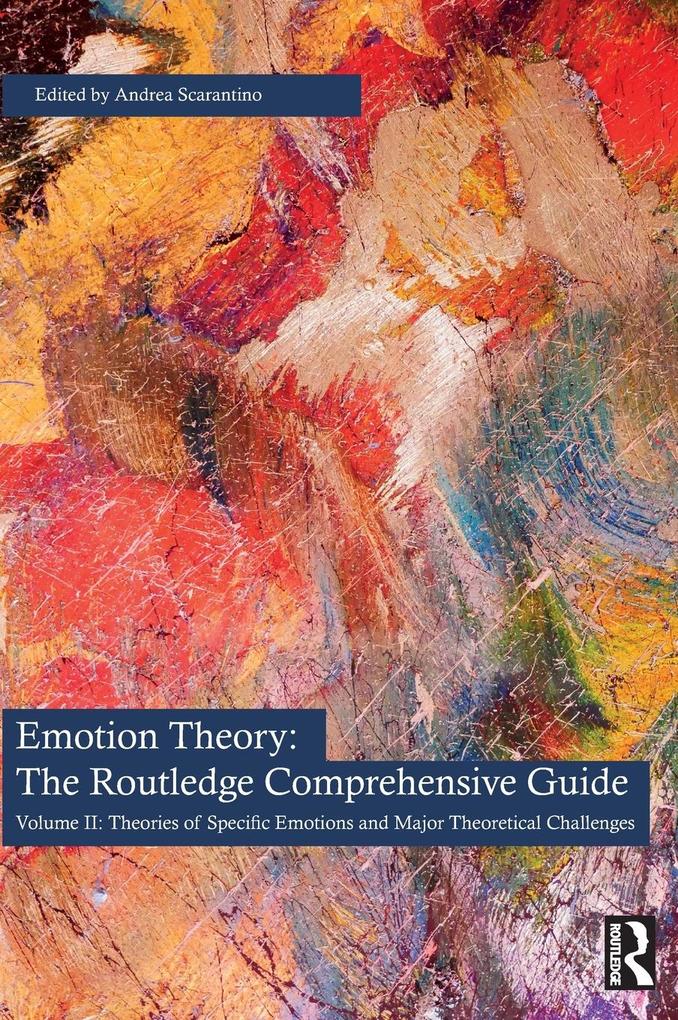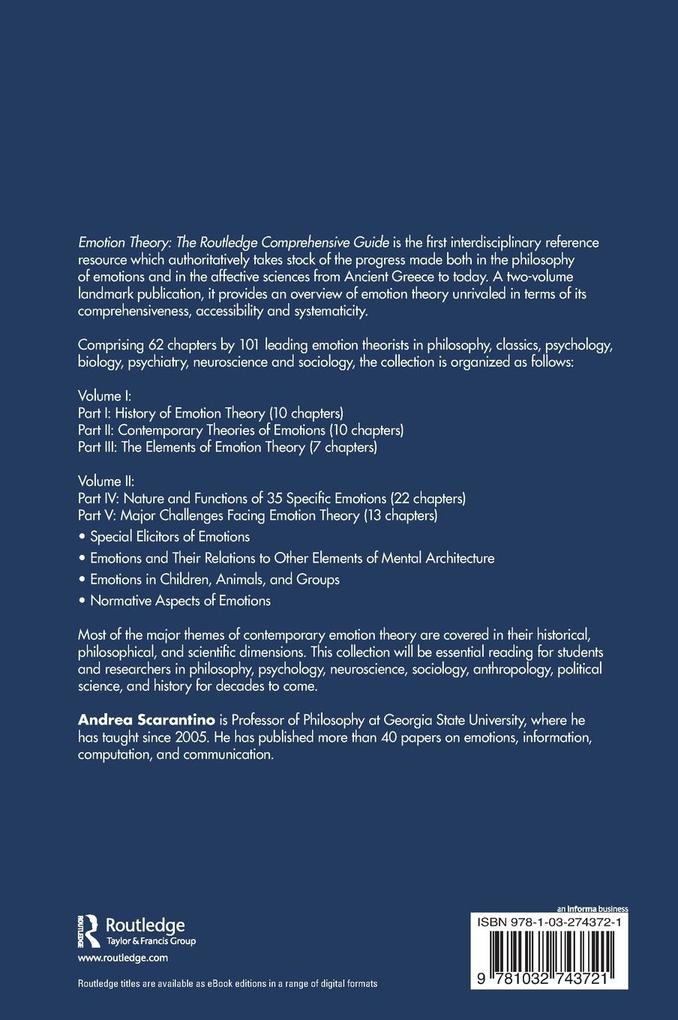
Zustellung: Do, 19.06. - Di, 24.06.
Versand in 1-2 Wochen
VersandkostenfreiBestellen & in Filiale abholen:
Emotion Theory: The Routledge Comprehensive Guide is the first interdisciplinary reference resource which authoritatively takes stock of the progress made both in the philosophy of emotions and in the affective sciences from Ancient Greece to today. A two-volume landmark publication, it provides an overview of emotion theory unrivaled in terms of its comprehensiveness, accessibility and systematicity.
Comprising 62 chapters by 101 leading emotion theorists in philosophy, classics, psychology, biology, psychiatry, neuroscience and sociology, the collection is organized as follows:
Volume I:
Part I: History of Emotion Theory (10 chapters)
Part II: Contemporary Theories of Emotions (10 chapters)
Part III: The Elements of Emotion Theory (7 chapters)
Volume II:
Part IV: Nature and Functions of 35 Specific Emotions (22 chapters)
Part V: Major Challenges Facing Emotion Theory (13 chapters)
- Special Elicitors of Emotions
- Emotions and Their Relations to Other Elements of Mental Architecture
- Emotions in Children, Animals, and Groups
- Normative Aspects of Emotions
Most of the major themes of contemporary emotion theory are covered in their historical, philosophical, and scientific dimensions. This collection will be essential reading for students and researchers in philosophy, psychology, neuroscience, sociology, anthropology, political science, and history for decades to come.
Inhaltsverzeichnis
Introduction to Volume II: Theories of Specific Emotions, a Master Table of Case Studies and Some Key Challenges Andrea Scarantino
Part IV: Contemporary Theories of Specific Emotions
28. Amusement Ruch Willibald and Jenny Hofmann
29. Anger and Interpersonal Dislike Ira Roseman
30. Compassion, Gratitude, and Awe Jennifer Stellar and Amie Gordon
31. Contempt and Hate Agneta Fischer
32. Desire Timothy Schroeder
33. Disgust Joshua Tybur
34. Empathy and Sympathy Karsten Stueber
35. Envy and Jealousy Kristján Kristjánsson
36. Fear Temidayo Orederu, Veronica Lennon, Bram Vervliet, and Daniela Schiller
37. Guilt, Embarassment and Shame Jerry Parrott
38. Happiness/Subjective Well-Being Ed Diener and Jing-Ha Sim
39. Hope and Enthusiasm/Excitement Michael Milona, Hunter Threadgill and Philip Gable
40. Interest Dustin B. Thoman and Christina C. Leal
41. Love Sue Carter and Elaine Hatfield
42. Lust/Sexual Desire Frederick Toates
43. Pain and Pleasure Murat Aydede
44. Pride Jessica Tracy, Aaron C. Weidman, and Eric Mercadante
45. Regret Marcel Zeelenberg
46. Sadness and Depression Reuma Gadassi-Polack, Matthias Siemer and Jutta Joormann
47. Stress Robert-Paul Juster and Sonia Lupien
48. Surprise Gernot Horstmann and Achim Schuetzwohl
49. Amae, Shadefreude, Saudade Michael Boiger, Yukiko Uchida and Igor de Almeida
Part V: Some Major Theoretical Challenges Facing Emotion Theory
Special Elicitors of Emotions
50. How Does Music Elicit Emotions? Robina Day and William Forde Thompson
51. How Does Fiction Elicit Emotions? Florian Cova and Stacie Friend
Emotions and their Relations to Other Elements of Mental Architecture
52. How Do Emotions Affect Decision Making? Jennifer Lerner, Charlie Dorison and Joowon Kim
53. How Can Emotions Be Regulated? Andero Uusberg, Helen Uusberg, and James Gross
54. How Do Emotions Differ from Moods? Carolyn Price
55. How Are Emotions and the Self Related? Mauro Rossi and Christine Tappolet
Emotions in Children, Animals and Groups
56. How Do Emotions Develop in Children? Linda Camras
57. Do Animals Have Emotions? Elizabeth S. Paul, Vikki Neville and Michael T. Mendl
58. Can Groups Have Collective Emotions? Mikko Salmela
Normative Aspects of Emotions
59. What Makes Emotions Appropriate or Inappropriate to Their Objects? Justin D'Arms
60. How Do Emotions Become Dysfunctional? Kathy Dixon-Gordon and Lauren Haliczer
61. What Roles Do Emotions Play in Morality? Antti Kauppinen
62. Can Emotions Provide Knowledge, Justification or Understanding? Julien Deonna and Fabrice Teroni
Produktdetails
Erscheinungsdatum
23. Juli 2024
Sprache
englisch
Seitenanzahl
740
Herausgegeben von
Andrea Scarantino
Verlag/Hersteller
Produktart
gebunden
Gewicht
1562 g
Größe (L/B/H)
260/183/44 mm
ISBN
9781032743721
Entdecken Sie mehr
Pressestimmen
"This is an astonishingly comprehensive and useful work of reference that succeeds as never before in encapsulating the history, typology, diversity, and utility of approaches to emotion theory in a wide range of disciplines. Emotion researchers constantly run the risk allowing themselves to be confined within their own specialisms and research cultures. Scarantino's collection offers students of emotion at all levels of experience a way out of their disciplinary silos and into new and exciting avenues of research." -- Douglas Cairns, University of Edinburgh
"Emotion Theory: The Routledge Comprehensive Guide is an authoritative yet engaging handbook on emotion, giving insights into both the history and modern cutting-edge perspectives on the field. These magisterial two volumes, edited by Andrea Scarantino, bring together the best contemporary psychologists and philosophers of emotion, writing from many different theoretical positions. Whether you are interested in a particular emotion, a particular emotion theory, or how to think more generally about emotions, Emotion Theory will be an invaluable guide." - Kent Berridge, University of Michigan
"Emotion Theory: The Routledge Comprehensive Guide is a towering achievement. Its breadth is manifested both in the variety of the scientific disciplines represented-philosophy, classics, history, psychology, biology, psychiatry, neuroscience and sociology-and in the theoretical perspectives explored in its 62 Chapters. One would be hard pressed to think of an idea or problem about emotions that is not discussed. Editor Andrea Scarantino recruited 101 leading researchers and rising stars to cover a comprehensive range of scientific and philosophical approaches. And while he seems to have prevailed on them all to demystify technical terms and write lucidly enough to be read with pleasure by non-specialists, experts in emotion research will also find something to learn from every essay. The book could be used In a course on Emotion Science or Philosophy of Emotions in many ways, such as surveying the theories and approaches figuring in current debates, taking a historical perspective on the field as a whole, or zooming in for a more in-depth look at any of 35 specific emotions ranging from anxiety and disgust, through lust, sadness and depression, to saudade and Schadenfreude." - Ronald de Sousa, University of Toronto
"All one would want to know about emotion theory in philosophy and affective sciences can be found in the two volumes of this comprehensive, interdisciplinary publication - an extraordinary achievement by the 101 authors and particularly the editor. Andrea Scarantino has done an extremely impressive job in planning the contents and identifying expert authors. In addition, he has worked intensively with the authors to fine-tune their contributions. The result is a milestone for the field of emotion, an ideal basis to finally achieve some degree of theory convergence in a field that has a long history of being beset by theoretical controversies." - Klaus Scherer, University of Geneva and University of Munich
Bewertungen
0 Bewertungen
Es wurden noch keine Bewertungen abgegeben. Schreiben Sie die erste Bewertung zu "Emotion Theory" und helfen Sie damit anderen bei der Kaufentscheidung.










